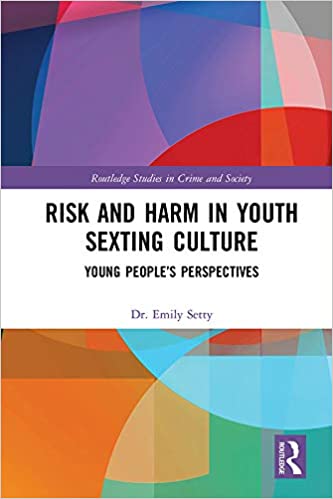This book explores young people’s perspectives on risk and harm in youth sexting, specifically privacy violations and unwanted, pressured and coerced sexting.
This book engages with key debates, academic literature and evidence, as well as findings of a study into young people’s perceptions of, attitudes toward and experiences of sexting. It challenges predominant assumptions that youth sexting is inherently risky and deviant and sets out the specific contexts in which privacy violations and unwanted sexting occur. It explores the sociocultural contexts underpinning harm, including gender, sexism, sexuality, status and power, and associated constructs of risk and shame, as well as broader youth cultural contexts that create and giving meaning to sexters and sexting practices, particularly related to victim-blaming, social shaming, bullying, harassment and abuse. Finally, it discusses young people’s attitudes and beliefs about interventions to reduce the prevalence of youth sexting. In doing so, the book critically engages with young people’s perspectives in order make practical recommendations for encouraging a ‘digital sexual ethics’ based on rights to bodily and sexual expression, autonomy and integrity, positive bystander intervention, and anti-victim blaming and abuse messages.
This book will be of great interest to scholars and students of criminology, education, social care, sociology and health. It will also be a valuable resource for those working in educational and social care settings such as sex educators, youth and social workers, youth counsellors and mental health professionals.
This book engages with key debates, academic literature and evidence, as well as findings of a study into young people’s perceptions of, attitudes toward and experiences of sexting. It challenges predominant assumptions that youth sexting is inherently risky and deviant and sets out the specific contexts in which privacy violations and unwanted sexting occur. It explores the sociocultural contexts underpinning harm, including gender, sexism, sexuality, status and power, and associated constructs of risk and shame, as well as broader youth cultural contexts that create and giving meaning to sexters and sexting practices, particularly related to victim-blaming, social shaming, bullying, harassment and abuse. Finally, it discusses young people’s attitudes and beliefs about interventions to reduce the prevalence of youth sexting. In doing so, the book critically engages with young people’s perspectives in order make practical recommendations for encouraging a ‘digital sexual ethics’ based on rights to bodily and sexual expression, autonomy and integrity, positive bystander intervention, and anti-victim blaming and abuse messages.
This book will be of great interest to scholars and students of criminology, education, social care, sociology and health. It will also be a valuable resource for those working in educational and social care settings such as sex educators, youth and social workers, youth counsellors and mental health professionals.











